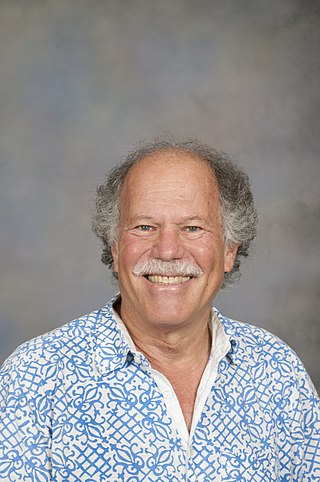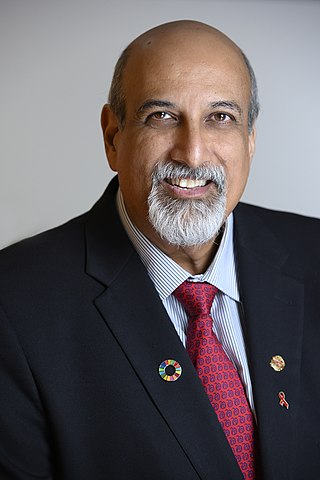In medicine, public health, and biology, transmission is the passing of a pathogen causing communicable disease from an infected host individual or group to a particular individual or group, regardless of whether the other individual was previously infected. The term strictly refers to the transmission of microorganisms directly from one individual to another by one or more of the following means:

The sociology of health and illness, sociology of health and wellness, or health sociology examines the interaction between society and health. As a field of study it is interested in all aspects of life, including contemporary as well as historical influences, that impact and alter our health and wellbeing.
This is a timeline of HIV/AIDS, including but not limited to cases before 1980.

The Uganda Virus Research Institute (UVRI) is a medical research institute owned by the Uganda government that carries out research on communicable diseases in man and animals, with emphasis on viral transmitted infections. UVRI is a component of Uganda National Health Research Organization (UNHRO), an umbrella organization for health research within Uganda.

The global pandemic of HIV/AIDS began in 1981, and is an ongoing worldwide public health issue. According to the World Health Organization (WHO), by 2023, HIV/AIDS had killed approximately 40.4 million people, and approximately 39 million people were infected with HIV globally. Of these, 29.8 million people (75%) are receiving antiretroviral treatment. There were about 630,000 deaths from HIV/AIDS in 2022. The 2015 Global Burden of Disease Study estimated that the global incidence of HIV infection peaked in 1997 at 3.3 million per year. Global incidence fell rapidly from 1997 to 2005, to about 2.6 million per year. Incidence of HIV has continued to fall, decreasing by 23% from 2010 to 2020, with progress dominated by decreases in Eastern Africa and Southern Africa. As of 2020, there are approximately 1.5 million new infections of HIV per year globally.

The AIDS Clinical Trials Group network (ACTG) is one of the largest HIV clinical trials organizations in the world, playing a major role in setting standards of care for HIV infection and opportunistic diseases related to HIV and AIDS in the United States and the developing world. The ACTG is composed of, and directed by, leading clinical scientists in HIV/AIDS therapeutic research. The ACTG is funded by the Department of Health and Human Services, National Institutes of Health through the National Institute of Allergy and Infectious Diseases.
The National Institute of Virology in Pune, India is an Indian virology research institute and part of the Indian Council of Medical Research (ICMR). It was previously known as 'Virus Research Centre' and was founded in collaboration with the Rockefeller Foundation. It has been designated as a WHO H5 reference laboratory for SE Asia region.

The situation with the spread of HIV/AIDS in Russia is described by some researchers as an epidemic. The first cases of human immunodeficiency virus infection were recorded in the USSR in 1985-1987. Patient zero is officially considered to be a military interpreter who worked in Tanzania in the early 1980s and was infected by a local man during sexual contact. After 1988—1989 Elista HIV outbreak, the disease became known to the general public and the first AIDS centers were established. In 1995-1996, the virus spread among injecting drug users (IDUs) and soon expanded throughout the country. By 2006, HIV had spread beyond the vulnerable IDU group, endangering their heterosexual partners and potentially the entire population.
The history of HIV/AIDS in Australia is distinctive, as Australian government bodies recognised and responded to the AIDS pandemic relatively swiftly, with the implementation of effective disease prevention and public health programs, such as needle and syringe programs (NSPs). As a result, despite significant numbers of at-risk group members contracting the virus in the early period following its discovery, Australia achieved and has maintained a low rate of HIV infection in comparison to the rest of the world.

A sexually transmitted infection (STI), also referred to as a sexually transmitted disease (STD) and the older term venereal disease (VD), is an infection that is spread by sexual activity, especially vaginal intercourse, anal sex, oral sex, or sometimes manual sex. STIs often do not initially cause symptoms, which results in a risk of transmitting them on to others. The term sexually transmitted infection is generally preferred over sexually transmitted disease or venereal disease, as it includes cases with no symptomatic disease. Symptoms and signs of STIs may include vaginal discharge, penile discharge, ulcers on or around the genitals, and pelvic pain. Some STIs can cause infertility.

Fairfield Infectious Diseases Hospital, originally known as Queens Memorial Infectious Diseases Hospital, operated from 1904 to its closure in 1996. Perched high on the banks of the Yarra River at Yarra Bend in the inner Melbourne suburb of Fairfield, it developed an international reputation for the research and treatment of infectious diseases. When it closed, it was the last specific infectious diseases hospital in Australia.
Ian David Gust AO, FRCPA, FRACP, MASM, FT is an Australian medical researcher, virologist, and former science administrator. Gust's area of work is in the development of drugs and vaccines against viral diseases and he is best known for the development of vaccines against the Hepatitis A virus. He currently serves as a non–executive company director and consultant.
Robert Palmer Beasley was an American physician, public health educator and epidemiologist whose work on hepatitis B involved extensive investigations in Taiwan. That work established that hepatitis B virus (HBV) is a primary cause of liver cancer and that hepatitis B virus is transmitted from mother to infant during childbirth. Beasley and his colleagues also proved that HBV mother-to-infant transmission is preventable by at-birth vaccination. Due to this work, the World Health Assembly designated HBV as the seventh global vaccine in 1992. He later became the author of HBV immunization policies for the World Health Organization.
The United States Intelligence Community (IC) has a long history of producing assessments on infectious diseases. Most of these papers are distributed to government administrators and inform the choices of policymakers. Three of these assessments stand out as analytical products that have had important impact on the awareness, funding and treatment of infectious diseases around the world. The first paper is the National Intelligence Estimate on the Global Infectious Disease Threat, the second paper is the assessment on the Next Wave of HIV/AIDS, and the third paper was the assessment on SARS. This page summarizes the findings of these three papers and provides information about their impact.

Ira M. Longini is an American biostatistician and infectious disease epidemiologist.

Salim S. Abdool Karim, MBChB, MMed, MS(Epi), FFPHM, FFPath (Virol), DipData, PhD, DSc(hc), FRS is a South African public health physician, epidemiologist and virologist who has played a leading role in the AIDS and COVID-19 pandemic. His scientific contributions have impacted the landscape of HIV prevention and treatment, saving thousands of lives.
David Albert Cooper was an Australian HIV/AIDS researcher, immunologist, professor at the University of New South Wales, and the director of the Kirby Institute. He and Professor Ron Penny diagnosed the first case of HIV in Australia.
Lisa Maher is Professor and head of Viral Hepatitis Epidemiology, at the Kirby Institute for Infection and Immunity, at the University of New South Wales and was made Member of the Order of Australia in 2015. She was awarded an Elizabeth Blackburn Fellowship, in Public Health from the NHMRC, in 2014. She is a fellow of the Australian Academy of Health and Medical Sciences.
Holly C. Hagan is an American infectious disease epidemiologist and nurse. She is a full professor in the College of Global Public Health at New York University and director of the Center for Drug Use and HIV/HCV Research.

Godefridus Johannes Petrus "Frits" van Griensven is a pioneering Dutch scientist in epidemiology, sociology and public health. Most of his work is on addressing the HIV epidemic among men who have sex with men and other HIV key populations.










